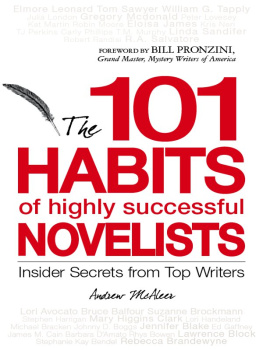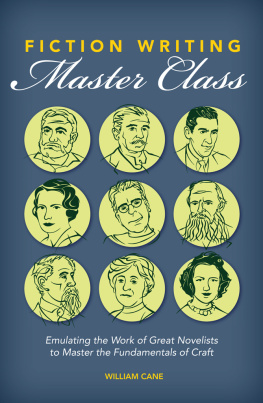
 The
The
HABITS
of highly successful
NOVELISTS
Insiders Secrets from Top Writers
Andrew McAleer

Copyright 2008 by Andrew McAleer
All rights reserved.
This book, or parts thereof, may not be reproduced in any
form without permission from the publisher; exceptions are
made for brief excerpts used in published reviews.
Published by
Adams Media, an F+W Publications Company
57 Littlefield Street, Avon, MA 02322. U.S.A.
www.adamsmedia.com
ISBN 10: 1-59869-589-4
ISBN 13: 978-1-59869-589-2
eISBN: 978-1-44051-524-8
Printed in the United States of America.
J I H G F E D C B A
Library of Congress Cataloging-in-Publication Data
is available from the publisher.
This publication is designed to provide accurate and authoritative information with regard to the subject matter covered. It is sold with the understanding that the publisher is not engaged in rendering legal, accounting, or other professional advice. If legal advice or other expert assistance is required, the services of a competent professional person should be sought.
From a Declaration of Principles jointly adopted by a Committee of the American Bar Association and a Committee of Publishers and Associations
Many of the designations used by manufacturers and sellers to distinguish their product are claimed as trademarks. Where those designations appear in this book and Adams Media was aware of a trademark claim, the designations have been printed with initial capital letters.
This book is available at quantity discounts for bulk purchases.
For information, please call 1-800-289-0963.
To my daughter, Trinity McAleer
An altar, not a station
And to my dear friend, Robin Moore
A Boston Brahmin adventurer

CONTENTS
FOREWORD
BY BILL PRONZINI
Professional writers are a highly diverse group. Not only do we produce many different types of novels, we tend to view the craft of fiction writing in a manner as individualistic as our subject matter, styles, and visions. Put a large group of us together in a room and call for a general theoretical discussion of what makes a successful novel and a successful career, and youre certain to have disparate opinions and more than one heated argument.
Yet when it comes to analyzing the nuts-and-bolts specifics of writing and selling as a guide for the beginner, our views and advice are remarkably similar. This is because professional writers are practical to a fault; the one principle we all agree on is the necessity to create the very best novels of which were capable in order to realize the optimum financial and critical benefits. Literary theory and philosophy are excellent fodder for conversation and argument, but theyre not what professional writing is fundamentally about. Nor are they what The 101 Habits of Highly Successful Novelists is about. The purpose of this book is to help you do what we do: write the best novel of which youre capable, experience the pleasure and satisfaction of seeing it published, and then reap the rewards. In short, its a straightforward, no nonsense, professional approach to fiction writing.
Andrew McAleer has done an outstanding job of organizing the material here into chapters that combine the instructive words of novelists past and present with his own expert commentary. Every aspect is covered: important general topics such as being creative and original, the art of natural storytelling, commitment to success, setting realistic goals and high standards of excellence; detailed how-tos and dont-dos of plot construction, characterization, dialogue, conflict, and other story elements; tips on marketing, finding an agent, utilizing promotional options, and networking; even counsel on how to deal with such drawbacks as rejection, criticism, and fear of failure.
Read the individual quotes carefully, not only for their practical advice but for the insights they give into the men and women who wrote them. For this is how successful novelists think. Understanding the professional mindset can help you adopt a similar perspective toward your own work.
In a sense, reading this book is like being invited into the roomful of established storytellers, being given the opportunity to sit down with each of us and get to know us while we discuss the various tricks of our trade. There are no better teachers, after all, than the voices of experience.
As practical and invaluable as The 101 Habits of Highly Successful Novelists is, you should keep in mind that it does not contain a magical formula for becoming a published writer. There is no such formula, nor are there any shortcuts to success. The instruction offered here is strictly utilitarian, remember; it must be studied, taken to heart, and then adapted and incorporated into your own work and work ethic. The key to success lies with dedication, perseverance, andthe ultimate goal of pros as well as beginnersthe consistent desire to become a better writer tomorrow than today.
Good luck!
INTRODUCTION
Everything nourishes what is strong already.Jane Austen
When I first set out to write The 101 Habits of Highly Successful Novelists, I had one goal in mind: to help aspiring novelists achieve their dreams of publishing novels. I believe firmly thanks to the generous contributions of some of the best and most experienced novelists of our timethat my goal has been brought to bountiful fruition.
What you have hitched your wagon to here is more than a book. It is a bumper crop of literary harvest propagated from the arduous toil of the contributors. You have at your fingertips the advice and wisdom of novelists who have successfully dug in and made fourteen-carat hay out of this business, some for more than half a century. This book is filled with advice from the most successful novelists from the most successful genres romance, crime and suspense, Westerns, science fiction, and fantasysuch as Mary Higgins Clark, Elmore Leonard, Robin Moore, and Lawrence Block.
Im not going to take much credit for this work because it wasnt written per se. It was germinated, and I just tilled the soil a little bit. This book was sown from the struggles, perseverance, and triumphs of its contributors, who simply would not quit when critics told them it couldnt be done, that they were wasting their time, that they shouldnt quit their day jobs, that writing was too tough, and that dreams are a waste of time. These novelists would have none of it, and you are the benefactor of the fruits of their labor.
The contributors to this book have brought a burgeoning cornucopia to the table. Its a crop consisting of nourishing words on how these indefatigable artists write continuously with such success. You can use their experience and advice to cut away the underbrush and prep the soil for planting. Further, you will be able to call on their advice again and again as if they were your helpful neighbors ready to roll up their sleeves and pitch in to help whenever needed.
I hope that this book will become your most trusted writing companion to nurture your muse. And it wont even need watering. Not like those corn plants that the damn rabbits got into.
Next page












 The
The
